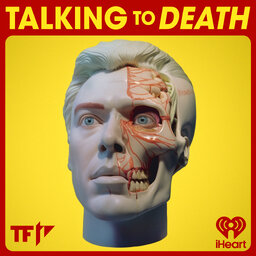Greg Mike | Street Art, Running from the Cops and AI
Greg Mike is a prominent figure in the street art community. His work often features bold colors, cartoonish characters, and a blend of pop culture references. As a self-taught artist, Greg Mike's career took off with his dynamic murals and street art installations, which have graced urban landscapes globally. His creative vision extends beyond traditional canvases, with collaborations that span from fashion brands to major corporations.
Subscribe to Tenderfoot+ for ad-free listening - https://tenderfoot.tv/plus/
Follow Talking to Death on Social:
IG: @talkingtodeath
TikTok: @talkingtodeathpodcast
In 1 playlist(s)
Talking to Death with Payne Lindsey
Up and Vanished host and creator Payne Lindsey wants to talk you to death in his first “true crime” …Social links
Follow podcast
Recent clips

Jason Flom | Wrongful Convictions, Death Row and Rock and Roll (RE-RELEASE)
55:33

Jeremy Corbell | UAP, Disclosure and Filmmaking (RE-RELEASE)
1:02:11

Maggie Freleng | Journalism, Serial Killers and Podcasting (RE-RELEASE)
1:22:22
 Talking to Death with Payne Lindsey
Talking to Death with Payne Lindsey